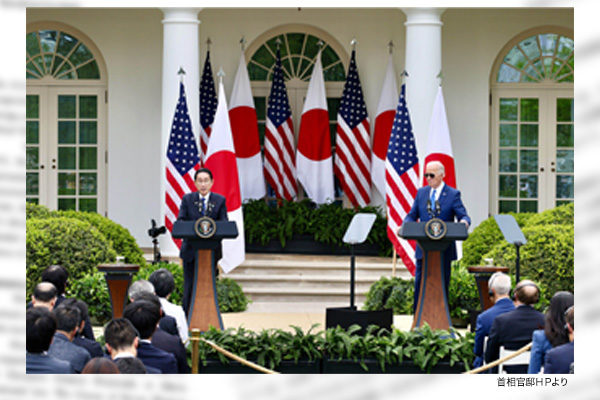At the Japan-U.S. summit meeting on April 10, a joint statement titled “Global Partners for the Future” was issued. Japanese Prime Minister Fumio Kishida in his address to the U.S. Congress on April 11 emphasized that Japan would fulfill its responsibility as a “global partner” of the United States.
This was not the first time that the global partnership was brought up at a U.S.-Japan summit. It was also featured when then Japanese Prime Ministers Noboru Takeshita, Toshiki Kaifu, and Kiichi Miyazawa held talks with the then U.S. presidents. This time, media seem to have focused on the military aspect of the partnership amid the worst security environment after World War II, including the Ukraine war, the Israeli-Hamas war, China’s hegemonic behaviors, and North Korea’s successive missile launches. As Kishida declared theatrically that Japan would “carry a large responsibility” together with the U.S., there are concerns based on a misunderstanding that the Japanese Self-Defense Forces might fight alongside the U.S. military on the opposite side of the planet.
Working with the U.S. in diplomacy, defense, economics, technology, and intelligence
The National Security Strategy approved by the cabinet in late 2022 calls for Japan to achieve its national security objectives through strategic approaches using organically and efficiently five tools: diplomatic, defense, economic, technological, and intelligence capabilities. Since the core of any alliance is defense capabilities, attention is focused on the upgrade of respective command-and-control frameworks of U.S. forces in Japan and the JSDF, the enhancement of security cooperation between Japan, the U.S. and the Philippines, and the strengthening of U.S. extended nuclear deterrence. However, the joint statement includes much more non-defense cooperation.
Regarding diplomatic capabilities, the joint statement pledged to strengthen cooperation frameworks with like-minded countries, such as Japan-U.S.-South Korea, Japan-U.S.-Australia, Japan-U.S.-U.K. and Australia-U.K.-U.S. (AUKUS), and called for all United Nations member states to uphold the UN Charter’s purposes and principles. The statement also underscored “the importance of candid communication with the PRC (People’s Republic of China)” to “reduce the risk of misunderstanding and miscalculation and to prevent conflict in the Indo-Pacific.”
As for economic capabilities, the joint statement called for advancing innovation, strengthening industrial bases, strengthening economic security through the U.S.-Japan Economic Policy Consultative Committee (economic “2+2”), promoting resilient supply chains, and cooperating to deter and address economic coercion.
On technological capabilities, the statement cited (1) the development and protection of critical and emerging technologies such as AI (artificial intelligence), quantum technology and semiconductors, and (2) convening regular talks to identify priority areas for partnering U.S. and Japanese defense industry. In regard to intelligence capabilities, the statement said the two countries would deepen cooperation on information and cyber security.
JSDF uncapable of global operation
The JSDF are not capable, either legally or practically, of conducting global scale military operations. However, Japan must fulfill its appropriate responsibility as a global partner of the U.S. with its comprehensive national power that integrates the five categories of capabilities including defense. To be “Global Partners for the Future” requires the involvement of government agencies. Japan needs to steadily fulfill its responsibility under strong leadership from the National Security Secretariat.
Kunio Orita is a member of the JINF Planning Committee and a special professor at Reitaku University. He is a retired Lieutenant General of the Japan Air Self-Defense Force.


